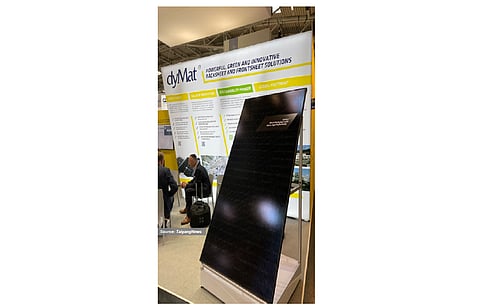

The solar industry has been celebrating its gigantic growth and expansion in module installations year after year. This success also comes with an underlying concern of waste disposal, a topic that is not yet at the top of the agenda but, if not properly addressed, would surely cast a shadow on the industry's prospects. Obviously, solar panels don't last forever, and the modules contain considerable amounts of polymer that require safe disposal. While not vouching for the entire module, PET resin supplier DuPont Teijin Film (DTF), in cooperation with Italy's backsheet manufacturer Coveme, took the first step of developing a backsheet with 33% recycled content. As also detailed in our previous edition (see TaiyangNews Market Survey On Backsheets & Encapsulation 2022), the LuxCR process developed by DTF breaks down the waste material to the starting monomer – the building block for all polyesters –, removes contamination, and then rebuilds it into a PET film for PV or any other application. It is like upcycling the PET waste and blending it with 2/3 virgin material to make PET films that can be used in backsheets. The key here is to make the recycled product's properties identical to one made with 100% virgin material.
Coveme takes the responsibility of developing backsheets using such PET film and commercializing them quite seriously. Indeed, the PET expert did make such a backsheet available under the dyMat ECO brand in 2 variants – 1,000 VDC and 1,500 VDC. "To our knowledge, we are the only backsheet producer in the market offering this kind of product," said Coveme's COO Monica Manara (see Pack Of Module Backsheet Innovations From Coveme).
Giving an update on the latest development with the project, DTF's EMEA market manager Steven Davies said that, in addition to recognized test protocols, the recycled PET (rPET) based backsheet is also subjected to testing by placing it on the front side of the module in order to expose it to 100% irradiance. In fact, backsheets based on the company's standard PET have also been subjected to such tests for 8 to 9 years with no changes in color nor mechanical properties, he emphasizes. So far, the project has proved that recycled content can be safely included into the backsheet. But the ultimate goal for DTF and Coveme is to establish a closed loop recycling process, meaning extracting backsheets from scrapped modules and using the recycled content to build new backsheets. "We are hoping to do proof of principle trials at a good scale next year," said Davies, but declined to provide any further details at this point.
American-Dutch backsheet supplier Endurans also highlights the recyclability of its products. Since the coextruded backsheets do not use any glue, the waste from the backsheet production, including the edge waste, can be directly remelted (see Backsheets Based On Coextrusion). The product also has a big advantage in terms of end-of-life recycling, according to Imco Goudswaard, sustainability lead at Endurans Solar. The coextruded PP backsheet polymer chemistry fully supports the recycling process, pyrolysis for example, to bring the backsheet or polymers back into the monomer state, and then polymerize it again. Speaking at the TaiyangNews Virtual Conference on Solar and Sustainability, Goudswaard reflected on the importance of sustainability in the field of solar PV backsheets.(see Protecting Solar PV Panels & Planet).
Topics such as sustainability and low carbon footprint are also catching up even in Asian countries, according to leading Chinese backsheet manufacturer Cybrid.. Thus, the industry is serious about non-fluoropolymer products, which according to Cybrid's Yang are already gaining good acceptance in the rooftop market, not only in Europe but also in China. He underscores that the nonfluoropolymer backsheet would become the main trend in the segment soon. In fact, Cybrid is also developing such products. Its latest PPC, which is a non-fluoropolymer (internal coating) based product, is a sure shot development in this direction. Even Crown, another backsheet manufacturer from China, is now exclusively focusing on nonfluoropolymers and Hangzhou First is also offering fluorine-free based coating products.
The article is an excerpt from the TaiyangNews Market Survey on Backsheets and Encapsulation 2022-23, which can be accessed free of charge here.
